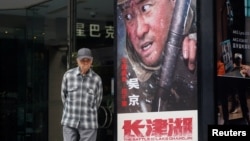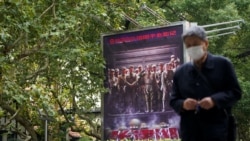The dramatic retelling of a decisive Korean War battle between Chinese soldiers and U.S.-led United Nations forces smashed box office records last month to become China’s third-highest grossing film of all-time, according to state media, amid a new push for patriotic-only historical accounts by the Communist Party.
Released over China’s National Day holidays in early October, The Battle at Lake Changjin is set during November 1950 and recounts how Chinese soldiers forced a retreat of U.N. forces from the Choisin Reservoir in present-day North Korea.
The film has already earned $875.5 million (5.6 billion RMB) since opening on September 30, according to the e-ticketing platform Maoyan, and it is still showing at some cinemas in China more than a month after opening.
The Battle at Lake Changjin was commissioned by the Chinese government ahead of the Communist Party’s 100th anniversary this year, and it is the latest in a series of patriotic war-time films to hit Chinese theatres in the last few years.
Other notable hits include The Korean War epic, The Sacrifice, The Eight Hundred, which recounts the 1937 Battle of Shanghai between invading Japanese forces and the National revolutionary Army, and The Wolf Warrior action film franchise about contemporary People’s Liberation Army soldiers.
In China, the Korean War is officially known as the war to “Resist U.S. Aggression and Aid Korea,” and it has inspired multiple films — but this time the story has changed. According to a review by The Washington Post newspaper, The Battle at Lake Changjin emphasizes the defeat of the United States rather than China’s close bonds with North Korea.
“The Korean War has always been used as propaganda by Beijing — that’s nothing new — but I think what is new is in recent years the elevated level of nationalism as well as the new circumstances in which China and the United States find themselves in,” Adam Ni, a China watcher and editor of the newsletter China Neican, told VOA.
“The Battle at Lake Changjin,” Ni said, “speaks to the moment” of souring U.S.-China relations — as well as the Party’s renewed emphasis on China’s history and an accompanying crackdown on “historical nihilism” that questions its official narrative of events.
In one of the most high-profile incidents, Chinese journalist Luo Changping was detained in early October for criticizing The Battle at Lake Changjin, according to The New York Times. Luo wrote on social media that more than 50 years later “few Chinese people have reflected on the justifiability of the war.”
Luo’s criticism could not have come at a worse time, however, as the Party celebrated its 100th anniversary on October 1. China’s historical narrative has remained front and center throughout celebrations and will be the subject of a resolution this week at the Sixth Plenum of the Central Committee — a meeting of more than 300 of China’s top leaders in Beijing.
“The Party sees the construction of historical narrative as an integral part of its power and of its legitimacy, so that’s why it’s come down pretty hard on historical nihilism — people who have visions of historical events that are different from the Party in a way that the Party perceives them to be harmful,” Ni said.
This trend is already making its way into popular culture where the Party is “rectifying the entertainment sector,” he said, by rewarding more patriotic films and pushing out more subservient ones. Less than a month after the success of The Battle at Lake Changjin, the government already announced a sequel — although other films may not be as lucky.
“The Party has a lot of resources and if your agenda overlaps, if your aesthetic and creative agenda overlaps with the party it could be a lucrative market opportunity because the Party has leverage over market opportunities,” Ni said. “But the other hand you get to the case of ‘boy love’ (LGBTQ-themed) stories or fantasy stories … you could be successful creatively and commercially, but on the other hand, you run the political risk of upsetting the Party.”





